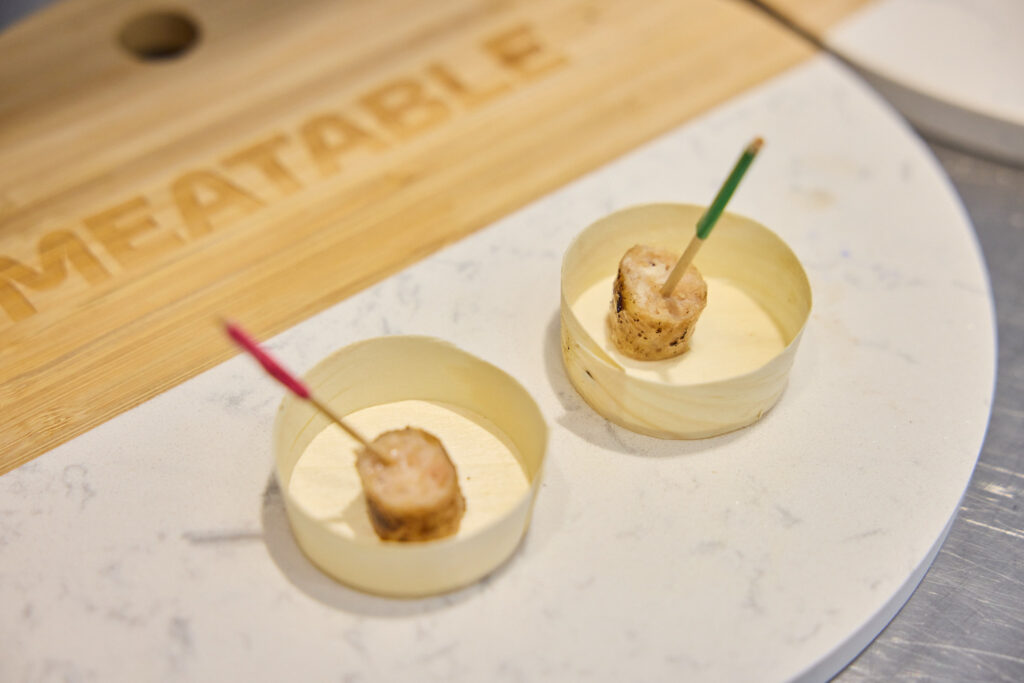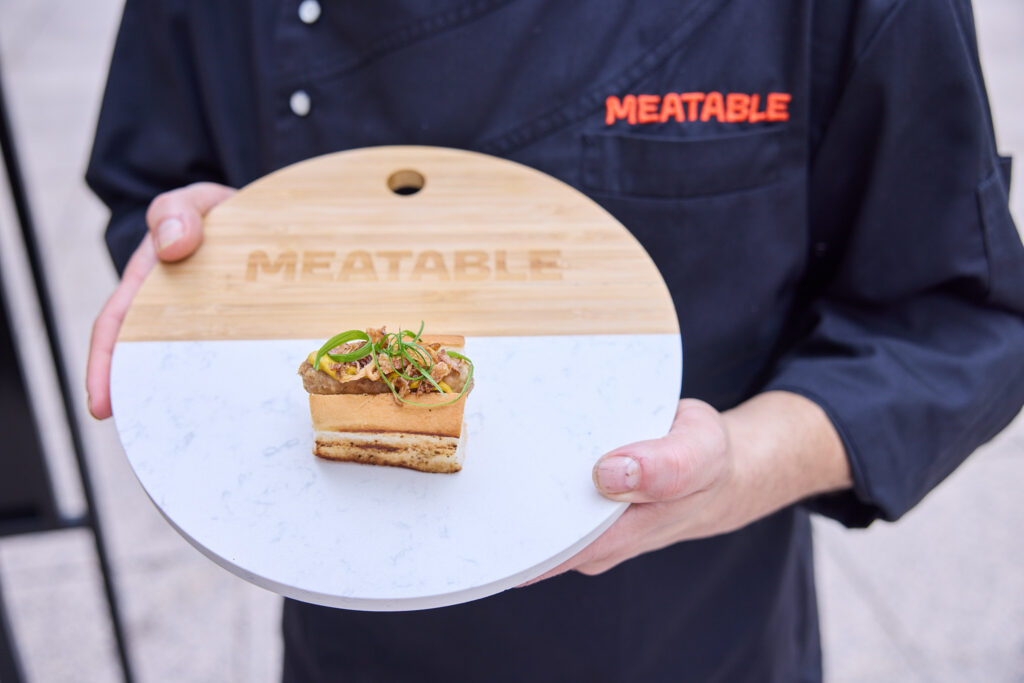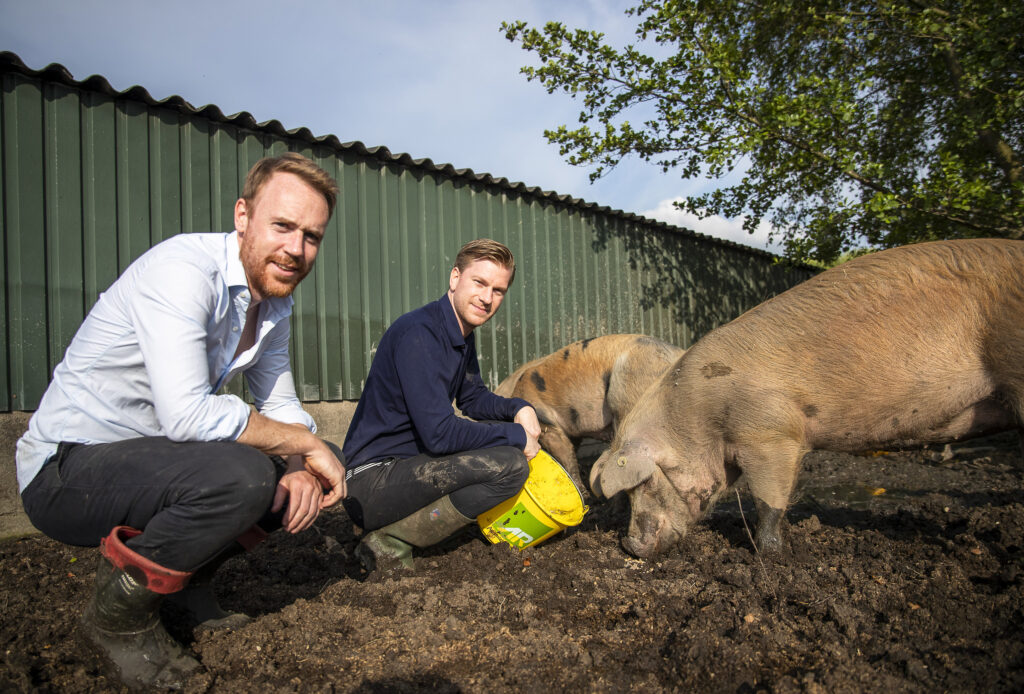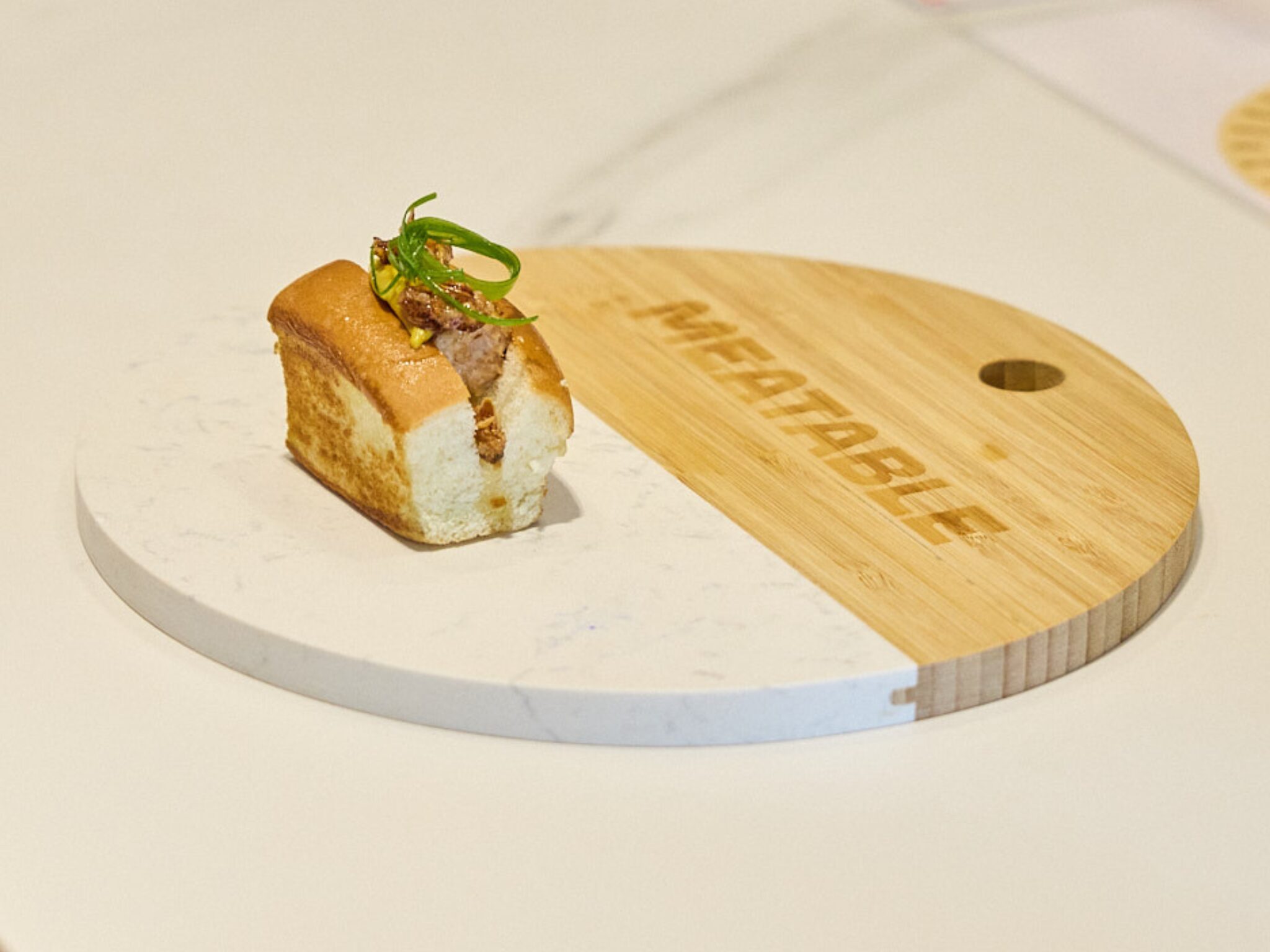Exclusive: Meatable Hosts the EU’s First Public Tasting for Cultivated Meat at Dutch HQ
9 Mins Read
Dutch cultivated pork startup Meatable today hosted the first public tasting event for cultivated meat in the European Union, following approval from the newly formed safety assessment panel in the Netherlands. It comes ahead of its launch in Singapore restaurants later this year.
Months after the Netherlands established an expert committee to evaluate applications for cultivated meat tastings, Leiden-based producer Meatable has officially hosted the first such event in the EU, showcasing its hybrid pork sausages to chefs, journalists, industry stakeholders and public officials.
Held at its 3,300 sq m headquarters at the Bio Science Park in Leiden, the public tasting convened the likes of two-Michelin-starred chef Ron Blaauw, Dutch prince and special envoy Constantijn van Oranje Techleap, as well as RESPECTfarms founder Ira van Eelen (who is the daughter of Willem van Eelen, widely considered the godfather of cultivated meat).
Meatable is hoping to gauge feedback from the tastings to optimise its product as it awaits regulatory approval and market entry, starting with Singapore later this year. The startup has already held two tasting events in the city-state, and will roll out its cultivated pork sausages in select restaurants following the greenlight from the Singapore Food Agency.
The event comes after Dutch government had introduced a Code of Practice to approve tastings of cultivated meat and seafood back in July. Meatable was the first company to file a dossier to the expert panel installed by the Cellular Agriculture Netherlands Foundation in January. “We were thrilled to receive the go-ahead from the committee earlier this year, and are delighted that we can finally have people try our products in our home country,” Meatable co-founder and chief technology officer Daan Luining tells Green Queen.
Hybrid meats deliver on flavour and quality

Meatable’s pork sausage is a hybrid meat product combining animal cells with plant-based ingredients. While it’s still under development and each tasting will inform the final product, the sausage presented at the tasting contained 28% cultivated pork fat.
The company’s decision to go down this route was strategic – hybrid meats have been touted by investors as the only way to make cultivated meat commercially feasible in the near term. Luining explains that while the company’s process can ultimately result in fully cultivated meat, the hybrid approach allows it to significantly increase the production output. He adds that this also delivers superior taste attributes over 100% plant-based analogues, and satisfies the quality expected by meat-eaters.
And that is evident in the reactions of the taste testers in Leiden. “I have already attended several tastings in other countries and have to say I found Meatable’s sausage to be remarkably delicious,” notes van Eelen, who called it a “huge step” for the sector.
“We trialled fully plant-based sausages to compare them to the sample with the cultivated pork fat,” writes Forbes’ Daniela De Lorenzo. “As [Meatable co-founder and CEO Krijn] de Nood told us, we shouldn’t be surprised it tastes like pork, which it really did.”
For the tasting, the cultivated sausage was cooked in a skillet over a stovetop by a professional chef, and served to attendees both on their own and as part of a bun. It was only the third tasting for cultivated meat in Europe, following US producer Fork & Good’s Swiss pub dinner in January and Australian startup Vow’s event in Iceland in February (earlier this month, it received Singaporean approval for its cultivated quail).
Last week, British newspaper the Telegraph’s food critic, William Sitwell, claimed the company had rescinded an invitation to taste their sausages, suggesting that it wanted journalists who were familiar with the scientific and technical aspects of cultivated meat. Sitwell implied the startup was keeping food critics away, writing: “If you want to get the public champing on the bit, get the food critics on side first.”
On the contrary, Luining says critics are an “important part of our outreach and our tastings” as it closes in on commercialisation: “We believe that food critics and consumers alike should ultimately be part of the experience, and we very much value their opinions and feedback.”
It appears the Telegraph incident was the result of a miscommunication. “The tasting invitation was seemingly transferred to him [Sitwell] without our permission. While we had very limited availability for this tasting, we look forward to continuing to welcome more people to our tastings soon,” says Luining.
“Under the new Dutch regulations, we were only able to invite a few people in to taste our products under very controlled conditions, but look forward to expanding for future tastings,” he explains. “We see this as a really positive step forward for both Meatable and the industry at large.”
Traversing the regulatory waters

Speaking of regulations, Meatable is working with food safety agencies across the world. Apart from filing for approval in Singapore last year, it has been in talks with both the US Department of Agriculture and the Food and Drug Administration, and hopes to enter the country in 2025. So far, only Eat JUST and UPSIDE Foods have been approved to sell cultivated meat in the US.
“By launching in Singapore first, we will be able to use the knowledge we get from that market for an effective US and then European launch later,” says Luining. The latter will no doubt be challenging, with the EU’s novel foods framework among the most stringent in the world. “In Europe, it’s a more complicated process. It can take years to receive approvals under the Novel Food Regulation, and the process also requires buy-in from all 27 member states,” he explains.
It’s the same reason why many companies target Singapore and the US first – the only other country to have greenlit these foods is Israel, who issued a ‘no questions’ letter to local cultivated beef producer Aleph Farms in January. It’s worth noting that Aleph Farms itself has filed for approval in Switzerland and the UK too, which aren’t part of the EU. The latter is expected to authorise the sale of cultivated cat food in the upcoming months.
“While we would love to move faster, we are using tastings like these in the Netherlands and Singapore to further inform us on product optimisation on our way to filing a dossier with the EFSA [European Food Safety Authority],” says Luining.
The other hurdle cultivated meat needs to clear is political. Legislators have been attempting to ban cultivated meat in the US and the EU, with Italy already having done so and Florida on the verge of it. These attempts have been criticised by alternative protein leaders, climate advocacy groups, and even the meat industry itself.
“Cultivated meat is a novel food and we understand that there are concerns about the impact it may have on farming and rural areas, especially in the US and EU,” Luining says. “But it’s important to note that we are not trying to replace these existing industries – we’re trying to create a more diversified and sustainable food supply chain.”
He adds: “Cultivated meat can exist next to plant-based alternatives and farm-raised meat. As the demand for meat is only forecasted to grow, the burden it places on our planet is clear. We believe that it is necessary to provide an alternative to people that still serves the appetite for real meat, without harming animals, people or the planet.”
Making cultivated meat faster than the rest

Meatable, which has attracted $95M in investments since its inception in 2018, has multiple manufacturing setups that will enable it to produce cultivated pork at scale. In October 2022, it partnered with Singapore’s ESCO Aster, the world’s first regulator-approved contracted cultivated meat manufacturing facility. A month later, it announced a co-manufacturing deal with another Singaporean company, Love Handle, to open a Future of Meat Innovation Centre for hybrid meat.
It moved to its current facility in Leiden in November last year, moving up from 50-litre bioreactors to reach a capacity of 200 litres (potentially extending to 500 litres). “This is an important step for us in scaling up. Next to that, we have started production on the ground in Singapore,” Meatable COO Carolien Wilschut told Green Queen before the Leiden move.
Another aspect that will aid its scale-up efforts is its updated production process, which has cut its manufacturing time in half to just four days. This is possible due to its Opti-ox technology, which enables it to make products by isolating a single animal cell, without the need for fetal bovine serum. The process revolves around the use of pluripotent stem cells (PSCs), which – unlike immortalised cell lines that need to be altered to multiply indefinitely – have the natural ability to continue multiplying, and do so rapidly.
This is coupled with a perfusion process that allows the startup to work in a continuous cycle to generate very high cell densities, and can produce fully differentiated muscle and fat cells in just four days – 60 times faster than it takes to rear a pig for pork. The breakthrough means Meatable can make cultivated meat faster than anybody else.
Consumers will dictate the possibilities of cultivated meat

At launch, the company is aiming to match the price point for high-end organic meats, with an ultimate path to price parity with conventionally farmed meat within the next few years. Holding public tasting events will help it finetune its sausage and gauge how consumers think about its product – but consumers’ appetite for cultivated meat can be mixed.
In the US, for example, one poll suggested that 45% are open to trying these foods. Similarly, 47% of Germans and 42% of Austrians are willing to eat them at least once. This falls to just over a third (34%) in the UK. In Singapore, acceptance for cultivated meat among those who have already tried is high, ranking 4.19 on a scale of 1 to 5 – buying and eating these products “significantly boosted” people’s acceptance, with diners expressing a strong willingness to try them again (a score of 4.41/5).
And another recent survey from the US shows that 60% of consumers would try cultivated pork in a restaurant, but this is much lower than the 88% who’d do so for conventional pork. “At this stage, it’s all about providing education about our product and its benefits. Once people have a chance to learn more about how it’s produced, and experience their first taste of a cultivated meat product, we believe people will be more willing to integrate it into their diet,” says Luining.
“In the end, we all know that the way we’re currently producing our food is not futureproof and recognise that cultivated meat can be part of the solution,” he adds. The Meatable co-founder hopes the Dutch tasting is the “first of many”, calling them “essential in helping us collect feedback for product optimization and an important part of education around cultivated meat”.
Speaking to Green Queen after its Singapore launch this month, Vow co-founder and CEO George Peppou suggested that we need to rethink cultivated meat. “Cultured meat only makes sense as a way to create new, delicious foods, not imitate the food we already know and love,” he said.
Luining agrees, reiterating that cultivated meat can co-exist with plant-based and farm-raised meat. “At Meatable, we are not trying to replace farm-raised meat; we’re trying to create additional options,” he outlines, adding that cultivated meat will be key in creating a cleaner planet for future generations. “In the end, consumers will ultimately choose how they want to experience the possibilities that cultivated meat presents.”



